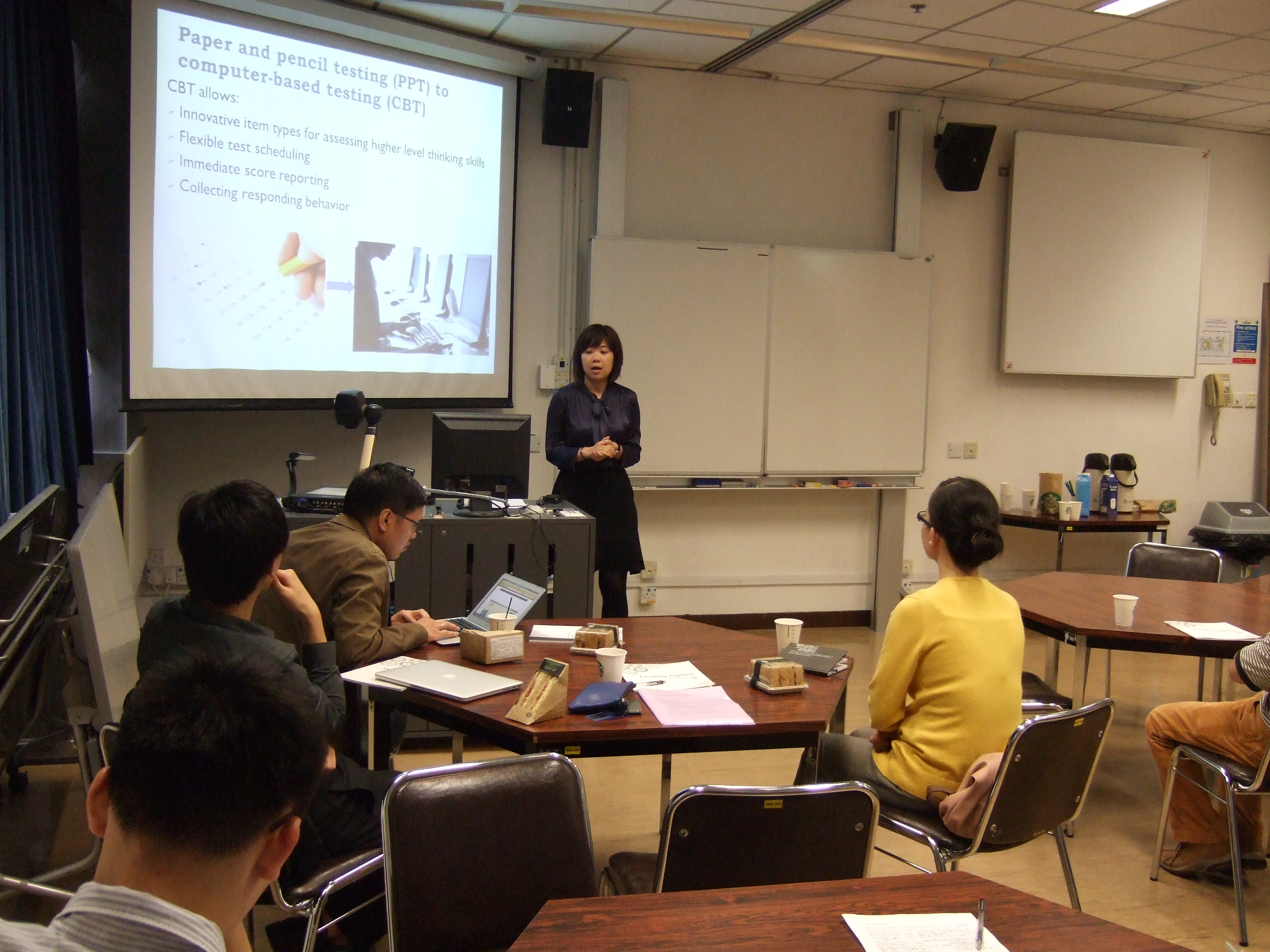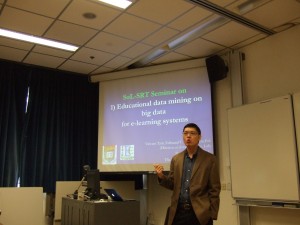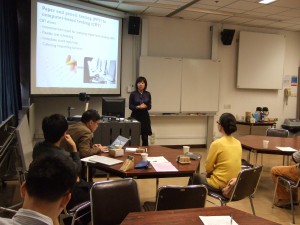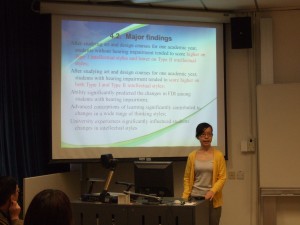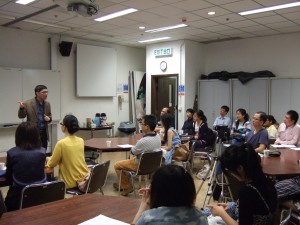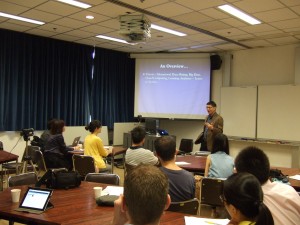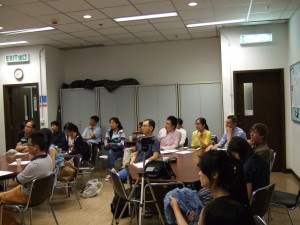Tag Archives: data mining
Technology enhanced learning: A dialogue between the fields of educational data mining, psychometrics and educational psychology
Date: 22nd May, 2014
Time: 12:30 to 14:30
Venue: Runme Shaw Building 204, The University of Hong Kong
Speakers: Dr Vincent Tam, Dr Maggie Zhao, Ms Sanyin Cheng
Program
Topic 1 Educational data mining on big data for e-learning systems (By Dr Vincent Tam)
Topic 2 Modern psychometrics and technology in educational assessment (by Dr Maggie Yue Zhao)
Topic 3 Intellectual styles and student development (by Ms Sanyin Cheng)
Introduction
During the past decade, educational data mining has emerged to provide positive value to educational improvement, together with conventional academic communities such as educational psychology, psychometrics, among others. Ostensibly, these different strands of research seem to be in conflict: one focus on identifying meaningful patterns in available data versus one structuring and confirming situations to provide evidence. Given their shared goals in enhancing educational practice, this hybrid seminar is formalized to provide a dialogue opportunity for communities of educational psychology, psychometric measurement and educational data mining to recognize the unique attributes of the other, thereby increasing opportunities for collaborative research between these communities.
Topic 1 Educational data mining on big data for e-learning systems
By Dr. Vincent Tam, Electrical and Electronic Engineering, HKU
Abstract
Educational data mining concerns about the application of data mining, machine learning and statistical methods to extract “possibly useful” information from the educational settings such as the e-learning or specifically intelligent tutoring systems. In this short presentation, we will briefly review some computational classification or machine learning methods that can be both efficient and effective to perform educational data mining on big data for e-learning systems such as our home-grown iClass system, an interactive and mobile learning application run on iOS or Android devices, developed by the e-Learning Development Laboratory in the University of Hong Kong. The latest development of the iClass project will be described. In addition, through an example application of the C4.5 inductive algorithm to analyze the obtained data sets in a Master of Science (M.Sc.) project, we will share our empirical experience in this project and hopefully shed light on some possible directions for future investigation on applying educational data mining methods on big data for the next-generation e-learning systems.
About the speaker
Dr. Vincent Tam is the Principal Lecturer and Honorary Assistant Professor in Electrical and Electronic Engineering, HKU. He was the recipient of the Faculty Best Teacher Award (2010) in the Faculty of Engineering. He has been actively involved as the principal or co-investigator of various teaching development projects, and currently serving on the Executive Board of the IEEE Technical Committee on Learning Technology. His research interests include cloud/mobile computing, e-learning systems and learning analytics.
Topic 2: Modern psychometrics and technology in educational assessment
By Dr Maggie Yue Zhao, Center for Enhancement of Teaching and Learning, HKU
Abstract
Education enters a new world of assessment with the advances in technology, psychometrics, and the learning sciences. Modern psychometric models have been developed in support of the development, analysis and scoring of a new generation of assessments. Technology provides solutions to many of the challenges faced by assessment programs, for instance, from computer delivery and innovative items to automated scoring, adaptive testing, automated test assembly, and providing diagnostic feedback. In the presentation, examples will be shown to demonstrate how modern psychometrics and technology can facilitate and enhance assessment. Participants will also be introduced advanced psychometric models that prepare and support the innovative assessments that take advantages of modern technology, such as, computerized adaptive assessment. Current practices, challenges, and future prospects will also be covered in the presentation.
About the speaker
Dr. Maggie Zhao earned her doctorate in Psychometrics and M.S. in Statistics both from University of Massachusetts. She is currently in charge of institutional surveys on student learning experiences at HKU. Prior to joining HKU, she worked as a psychometrician for Educational Testing Service (ETS). With the focus on the development, advancement and application of quantitative methods in the education, social and behavioral sciences, she has extensive experience in working with various assessment programs/projects, such as, large-scale educational assessment, psychological assessment, classroom assessment, quality of life measurement, language assessment, licensure and credentialing examination, assessment of student learning, and assessment of generic skills.
Topic 3: Intellectual styles and student development
By Ms Sanyin Cheng, Faculty of Education, HKU
Abstract
Intellectual styles refer to individuals’ preferred ways of processing information and dealing with tasks. Intellectual styles deserve as much attention as other individual differences variable such as ability and personality in understanding student development. This presentation will delineate the importance and uniqueness of intellectual styles at length, using findings from the speaker’s PHD research project as an example. This will involves five aspects: 1) the concept of intellectual styles is more acceptable to the audiences than ability and personality; 2) intellectual styles are multi-dimensional; 3) some intellectual styles are more conducive to positive student development; 4) intellectual styles are malleable and can be modified by personal factors and environmental factors; and 5) intellectual styles play as mediators in the relationships between personal factors and student developmental outcomes. This presentation will then point to the implications of existing studies concerning intellectual styles for future studies.
About the speaker
Ms Sanyin Cheng Sanyin is a final-year Ph.D student from the learning, diverse, and development division of the Education Faculty. Her main research interests covers individual differences (e.g., intellectual styles, abilities, and conceptions of learning) in student learning, performance, and development, inclusive higher education for students with hearing impairment, and psychological assessment for students with disabilities.



